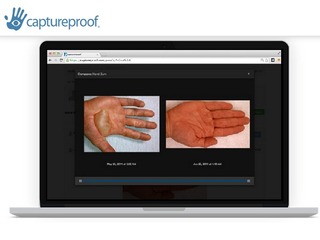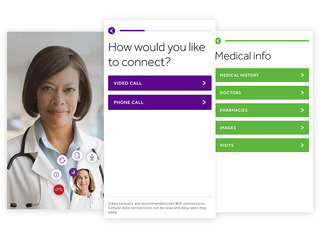
CirrusMD raises $15M to connect doctors and their patients via text
The company says it can create an ongoing dialogue that other telemedicine companies can't

The healthcare space is known for changing slowly, and for good reason: there's a ton of money flowing through the space, with a lot of moving parts. Also, people's lives are on the line and it makes sense to be careful and deliberate when making any change. In the last few years, though, there have been a number of developments that seem to have accelerated change at a much quicker rate, including the proliferation of data, thanks to EHRs, as well the ACA. One of the most important changes has been the rise of telemedicine, which allows patients to see their doctors on their own schedule, without even needing to leave the house.
Telemedicine is big business, with the global market projected to grow to $48.8 billion by 2023. However, there's an issue with these services: all they really do is essentially recreate an office visit online, without allowing for any kind of ongoing conversation between a patient and a doctor.
That's where CirrusMD comes in: it's a platform that offers a chat-first virtual care solution, allowing doctors and patients to text back and forth with each other, so that patients can get answers to their questions in a timely manner, and for doctors to easily follow up to see if their treatment is working.
On Thursday, the company announced that it raised $15 million in a Series B round of funding led by Drive Capital, Colorado Impact Fund and other prior investors. The round brings its total funding to $26 million.
The Denver-based company, which was founded seven years ago, was the vision of co-founder Blake McKinney, an ER doctor, who wanted to be able to expand his own experiences, where he would help people he knew with their medical needs, and allow everyone, even people who don't know a doctor personally, to have that same type of access.
"His vision was: how do we take the experience that his friends and family have when they have a medical need and simply send him a text message and expand that to everyone? How do we connect people to doctors instantaneously, in an ongoing fashion that isn’t bordered by time boundaries and provide an extraordinary experience that engenders trust in the care people are receiving?" Andy Altorfer, co-founder and Chief Executive Officer of CirrusMD, explained to me in an interview.
"What we realized is most of these services on the market in the broader telemedicine space have focused on, ‘How do we recreate an office visit online?’ We have taken a very different approach and are focused on asynchronous communication via a text-driven workflow so a patient can instantly text with a doctor. Our average response times are well under a minute and the patient and the doctor can continue to communicate for as long as is necessary about whatever that patient’s medical needs are."
The new funding round will primarily go toward expanding the CirrusMD team; the company expects to double its current 40 person employee base over the next year.
"We have a lot of opportunity to continue to grow with our existing customers, and we need to make sure that we put the resources and team members in place to continue supporting those customers," said Altorfer.
"We’re growing across the board in engineering, marketing, sales, and account management. And a big component of what we’re going to continue doing is expanding our physician network in both sheer number of doctors, and new specialties in things like primary care and a variety of other types of specialties focused on bringing even more ability to handle high acuity patients."
Partnering with insurance companies
Patients are not only able to text directly with their own doctor, but with other resources as well, including specialists, pharmacists, behavioral health professionals, and even non-clinical resources like schedulers and financial services. The texts are self documented, so there is a complete record of the entire interaction.
While doctors on the platform can connect to patients via other means, including video chats and phone calls, those are generally ancillary to the primary text-driven communication, Altorfer explained.
The company partners with large health plans, and also integrated delivery networks, which are mergers of an insurance plan plus a healthcare delivery system. As a result, most patients are never charged for accessing the platform, though some with high deductible plans may have a small co-pay.
"We found, because the structure of our workflow being built around text, it doesn’t fit into a lot of the traditional reimbursement paradigms, where many hospital systems tend to focus. So, we sought out who is actually at risk for lowering total cost of care and making things more efficient and what areas of the market are actually trying to drive an exceptional member experience. Also, in the context of insurance, how does an insurance plan begin to build trust with their member populations by bringing them services that deliver real value?" said Altorfer.
CirrusMD's partners already include four of the eight largest payer systems in the country; in addition to the funding news, the company also announced a new contract with Iron Bow as a subcontractor to the United States Department of Veteran Affairs (VA). The initial rollout with Iron Bow will make CirrusMD available for over 200,000 patients across three of the VA's medical centers.
"My co-founder Blake is a veteran, he was in the Marine Corp before he went to medical school, and we have a number of other senior leaders in our company that have military backgrounds. So, supporting the veteran population is something that is of great personal interest to our team. Providing a service that is going to expand access to care for veterans, who have had issues accessing care over the past number of years, is a very exciting opportunity for us," Altorfer told me.
Right now, CirrusMD is available to around 3 million patients and has over 600 doctors on the platform, with 200 in its own physician network and the rest coming from other customers in the integrated delivery space that staff their own doctors on the service.
A different kind of telemedicine company
There are plenty of other companies making a name for themselves in the telemedicine space, including Teladoc, which is a publicly traded company, and Doctor On Demand, which has raised over $160 million, CirrusMD takes a different approach
One of the major differentiators is that the platform is able to handle more serious conditions than a lot of other telemedicine services, due to the ability to have an ongoing communication between doctors and patients.
"Because our doctors can interact over time, we actually see about 40 percent of our encounter volume being what we would deem high acuity care that most other service offerings in telemedicine wouldn’t ever touch. That’s because the doctor doesn’t just have a five or 10 minute window where they’re interacting with the patient. They can say, ‘Hey, let’s keep in touch. Take these set of steps, here’s the care plan, and let’s reengage in the next hour and see how you’re doing,'" Altorfer said.
"That ability to not be bound by a time constraint allows the doctor to assess over time, which is something that is replicated in many brick and mortar workflows. That’s part of the reason why, when you go to the emergency room, you end up waiting two or three hours; they’re actually doing an assessment of how you’re progressing over time, and we can replicate that in a virtual fashion."
With its platform, CirrusMD has been able to demonstrate that three times more people use its service on average than traditional telemedicine services, and its platform has resulted in a 40 percent reduction in unnecessary emergency room visits. It has also seen patient satisfaction rates that are generally in the mid-90s. For the insurance companies, CirrusMD has seen a an average total cost savings per visit of around $335.
"People love using it. To me, it is the fastest pathway of access to a doctor that exists on the market today. If you have anything going on with your health and you want an instant response, and to be able reach somebody who can actually help you, there’s nothing more efficient that exists," Altorfer said.
Even with those other major players in the space, Altorfer really sees the company's competition as the status quo of the healthcare space itself.
"It’s a big, slow moving market, and the legacy fee for service paradigm represents a lot of problems for companies innovating. It creates unnatural, unnecessary barriers because people are so used to doing things in the same way it’s very, very hard to change," he said.
"We believe that we’ve found a lot of very fast moving, smart, innovative and early adopters that partnered with us, which has been very exciting to do. The biggest competition to truly delivering on lowering the total cost of care across large segments of patient populations is the status quo of healthcare."
The evolution of healthcare and telemedicine
With the health space changing so rapidly, Altorfer's vision for the future is that what we now see as healthtech will just be known as healthcare.
"The integration of a variety of both on-demand services, that are delivering medicine via new channels, like what we do, is going to become intertwined with all of the ways that care gets delivered. We’re going to be able to leverage new data sources to provide a higher level and a higher standard of care for patients, and to do so with better continuity. We’ve at a very exciting time where we’re starting to slowly change the direction of this giant ship but it’s going to take a while," he said.
For CirrusMD, the ultimate goal to create a world where everyone "can get instant access to a trusted doctor whenever they need it, at any time, regardless of where they are."
"That should be the entry point into the system for every patient’s care journey. Once that is proliferated throughout the market, I believe we’re going to start to see big changes in the way that medical care is delivered, both virtually and in the brick and mortar. I’d like to see lowered reliance on a very expensive brick and mortar office footprint by using virtual entry points as the start of each patient’s care experience, and as the center point and the hub of how patients get navigated through the care system."
Related Companies, Investors, and Entrepreneurs
CirrusMD Inc.
Startup/Business
Joined Vator on
CirrusMD partners health plans to create happier, healthier and more engaged members by connecting them to high-quality care conversation. CirrusMD’s chat-first virtual care platform enables continuous access in seconds to board-certified physicians across 50 states from any web-enabled device, providing members with seamless care conversation that happens on their terms. Designed to deliver an unparalleled user experience and barrier-free access, the CirrusMD platform drives average member utilization rates of up to triple telehealth industry averages. CirrusMD has partnered with the nation’s leading payers and integrated delivery networks to help millions of members and patients access extraordinary virtual care. Founded in 2012 and headquartered in Denver, Colorado, CirrusMD is led by co-founder and Chief Executive Officer Andy Altorfer and co-founder and Chief Medical Officer Blake McKinney, M.D.

Andrew Altorfer
Joined Vator on
Related News


How does Doctor On Demand make money?

How does Teladoc make money?

First Stop Health raises $2.1 million for telemedicine


Telemedicine app Doctor On Demand raises $50M

Glooko, Propeller Health, Enlitic on telemedicine trends


